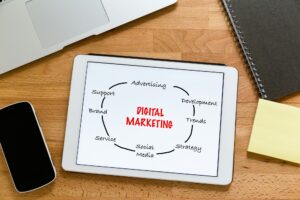In today’s digital age, the virtual landscape has become the new frontier for businesses of all sizes and industries. A robust online presence is no longer an option but a fundamental requirement for success. At the heart of this digital transformation lies the quintessential tool—the website. Whether you’re a local bakery or a global tech giant, having a website is imperative.
In this blog post, we explore why a website is crucial for every kind of business.
1. ESTABLISHING CREDIBILITY
In an era where consumers turn to the internet for information, a well-designed website is your business’s virtual storefront. It’s often the first interaction potential customers have with your brand. A professional website conveys trust and credibility, making it more likely for visitors to engage with your products or services.
2. EXPANDING REACH
A website breaks down geographical barriers, allowing your business to reach a global audience 24/7. This expanded reach can lead to increased sales and opportunities for growth that were previously unimaginable.
3. ACCESSIBILITY AND CONVENIENCE
The convenience of online shopping and information retrieval cannot be overstated. A website offers customers the ability to access your products or services anytime, anywhere. It caters to the modern consumer’s need for convenience and instant gratification.
4. MARKETING AND BRANDING
Websites serve as a hub for your digital marketing efforts. You can incorporate various marketing strategies, such as content marketing, SEO, and social media integration, to attract and engage your target audience effectively. Your website becomes the anchor for your brand’s online presence.
5. COMPETITIVE ADVANTAGE
In a competitive market, having a website is often what sets you apart from competitors. Customers frequently research businesses online before making a purchase decision. A professionally designed website can give you a competitive edge and help you stand out in the crowd.
6. CUSTOMER ENGAGEMENT
Interacting with customers is crucial for building lasting relationships. A website offers various tools for engagement, such as contact forms, chat support, and feedback mechanisms. It provides a platform to communicate with your audience and address their needs promptly.
7. SHOWCASE YOUR PORTFOLIO
For businesses in creative industries, like photography, design, or art, a website acts as a virtual portfolio. You can display your work in a visually appealing manner, allowing potential clients to explore your talents and expertise.
8. DATA AND ANALYTICS
Websites offer valuable insights into customer behavior and preferences. With tools like Google Analytics, you can gather data on website traffic, user demographics, and more. This information is invaluable for making data-driven business decisions.
9. ADAPTABILITY AND SCALABILITY
Your website can grow with your business. Whether you start as a small local business or an e-commerce giant, your website can adapt to your changing needs and scale accordingly.
10. COST-EFFECTIVE MARKETING
Compared to traditional advertising methods, a website is a cost-effective marketing tool. It provides a platform for reaching a broader audience without the high costs associated with print media or television ads.
Conclusion
In conclusion,
- A website is not just a digital accessory; it’s a critical component of modern business strategy.
- Regardless of your industry or business size, having a website is no longer optional— it’s a necessity for success in the digital age.
- It’s the gateway to establishing credibility, expanding your reach, and thriving in the competitive business landscape of today.






